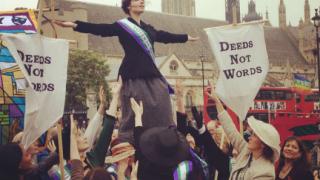
To mark UN Day from a women's rights perspective, UNA-UK Deputy Director Natalie Samarasinghe wrote this article for the Women's Resource Centre.
Making CEDAW count
Sometimes it’s hard to be a woman. Especially now, it seems.
In the UK, female unemployment has reached a 25-year high and those in work earn about 15% less than men. According to the Women’s Budget Group, women accounted for over 70% of the 2010 budget savings, mostly through tax and benefit changes. We are over-represented in part-time, low-paid work and under-represented in the boardroom and in government. With 17% and 22% respectively, both the UK cabinet and Parliament fall short of the UN’s recommended target for women’s representation.
These trends are mirrored internationally. According to the United Nations, women perform 66% of the world’s work but earn just 10% of the income. If you take any indicator of development, rights or security and disaggregate the data by gender, chances are the results will be shocking, whether it’s the low percentage of female literacy or the high incidence of maternal mortality. It seems that everywhere, progress for women is stalling or reversing, from Iran’s recent curbs on women’s education to the worrying ‘interpretations’ of rape by US politicians.
Two days ago, hundreds of women gathered in Westminster to draw attention to these issues. This was also United Nations Day, as on the same day in 1945, the UN Charter came into force – the first global treaty to recognise gender equality.
For an organisation that has never had a women at its helm, the UN has played a vital role in setting standards and in practical action to help millions of women improve their lives. Perhaps its most important achievement is the Convention on the Elimination of All Forms of Discrimination Against Women (CEDAW).
CEDAW is a unique instrument. It is dedicated specifically to women’s empowerment and is far more comprehensive than UK or EU legislation, covering the full spectrum of rights, from political to economic to reproductive. It goes beyond narrow legal measures by asking governments to extend jurisdiction to the private sphere (where many violations against women occur) and to focus on outcomes, aiming for real equality, not just equality on paper. It also has the potential to be a powerful tool for women in the UK.
The Convention provides a progressive, internationally recognised framework for guiding, monitoring and holding the UK to account. But to be effective, it needs the active participation of civil society. Although the UK has been party to CEDAW since 1986, it remains little known here and critically underused.
We now have an opportunity to change that. In 2013, the UN will be reviewing the UK’s obligations under CEDAW. As part of this process, individuals and organisations can provide feedback to an independent UN committee.
As well as conveying more immediate concerns, this feedback should push for the following: first, the incorporation of CEDAW into UK law. Successive governments have argued that its provisions are covered by existing laws and that legislation is not the only way to implement them. But this means that CEDAW cannot be used as the basis for a legal claim.
Second, while legislation certainly isn’t the only way forward, alternative means of implementation must be sustainable. This entails giving public bodies a clear mandate (and adequate funds) to ensure they are responsive to women, and providing both integrated and specialised women’s services. It also means supporting women’s groups who provide crucial services at the local level, from family planning to domestic violence shelters.
Third, the UK should shift its focus from equality of treatment to equality of outcomes. This includes the use of temporary measures to boost women’s education and representation, in the police and judiciary, for example. And finally, the UK should do more to raise awareness of CEDAW and make it an integral part of education and training, for public servants and the wider population.
In 1945, it was activists who pushed for the UN Charter to make explicit reference to women. We must keep pushing now.
This article originally appeared on the Women's Resource Centre blog: thewomensresource.tumblr.com
For a wider discussion on these issues, please attend the (free) UNA Women's Advisory Council conference on 21 November with guest speaker Lady Anne Greenstock, a patron of UN Women UK
[Photo - UK Feminista lobby of Parliament on 24 October 2012 - click here for more information]






